Synthetic Cannabinoids Market
Synthetic Cannabinoids Market Size and Share Forecast Outlook 2025 to 2035
Synthetic cannabinoids market is projected to grow from USD 1.1 billion in 2025 to USD 2.2 billion by 2035, at a CAGR of 7.0%. Pharmaceutical Grade will dominate with a 54.0% market share, while pain/neurology r&d will lead the application segment with a 46.0% share.
Synthetic Cannabinoids Market Forecast and Outlook 2025 to 2035
The global synthetic cannabinoids market is valued at USD 1.1 billion in 2025. It is slated to reach USD 2.2 billion by 2035, recording an absolute increase of USD 1.1 billion over the forecast period. This translates into a total growth of 100.0%, with the market forecast to expand at a compound annual growth rate (CAGR) of 7% between 2025 and 2035.
The overall market size is expected to grow by exactly 2X during the same period, supported by increasing pharmaceutical research into cannabinoid therapeutics, growing acceptance of medical cannabis research, expanding clinical trials for neurological conditions, and rising investment in synthetic cannabinoid drug development.
Quick Stats for Synthetic Cannabinoids Market
- Synthetic Cannabinoids Market Value (2025): USD 1.1 billion
- Synthetic Cannabinoids Market Forecast Value (2035): USD 2.2 billion
- Synthetic Cannabinoids Market Forecast CAGR: 7%
- Leading Product Type in Synthetic Cannabinoids Market: Pharmaceutical Grade
- Key Growth Regions in Synthetic Cannabinoids Market: North America, Europe, and Asia-Pacific
- Key Players in Synthetic Cannabinoids Market: Jazz Pharmaceuticals, Insys Therapeutics, GW Research, Canopy Growth, Tilray Brands, Corbus Pharmaceuticals
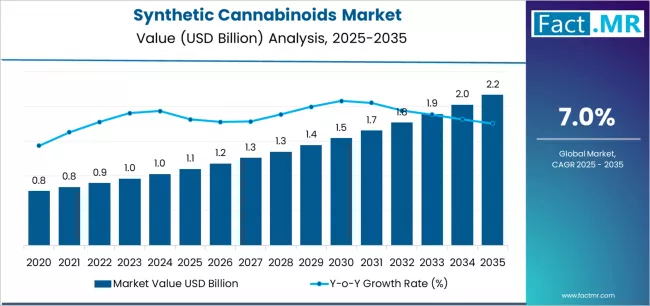
Between 2025 and 2030, the synthetic cannabinoids market is projected to expand from USD 1.1 billion to USD 1.6 billion, resulting in a value increase of USD 0.5 billion, which represents 45.5% of the total forecast growth for the decade. This phase of development will be shaped by increasing clinical trial activities, growing regulatory acceptance of cannabinoid research, and expanding pharmaceutical applications for pain management and neurological disorders. Pharmaceutical companies and research institutions are expanding their synthetic cannabinoid capabilities to address the growing demand for cannabinoid-based therapeutics and research compounds.
Synthetic Cannabinoids Market Key Takeaways
| Metric | Value |
|---|---|
| Estimated Value in (2025E) | USD 1.1 billion |
| Forecast Value in (2035F) | USD 2.2 billion |
| Forecast CAGR (2025 to 2035) | 7% |
From 2030 to 2035, the market is forecast to grow from USD 1.6 billion to USD 2.2 billion, adding another USD 0.6 billion, which constitutes 54.5% of the overall ten-year expansion. This period is expected to be characterized by the expansion of approved therapeutic applications, development of novel synthetic cannabinoid compounds, and growth of personalized cannabinoid medicine approaches. The growing adoption of precision medicine and targeted cannabinoid therapies will drive demand for synthetic cannabinoids with enhanced selectivity and therapeutic profiles.
Between 2020 and 2025, the synthetic cannabinoids market experienced accelerated growth, driven by increasing pharmaceutical research into cannabinoid mechanisms and growing recognition of synthetic cannabinoids as valuable tools for drug discovery and therapeutic development. The market developed as pharmaceutical companies and research institutions recognized the potential for synthetic cannabinoids to provide controlled therapeutic effects, support clinical research, and enable drug development while meeting regulatory requirements and safety standards.
Why is the Synthetic Cannabinoids Market Growing?
Market expansion is being supported by the increasing pharmaceutical interest in cannabinoid-based therapeutics driven by growing understanding of the endocannabinoid system and therapeutic potential, alongside the corresponding need for precisely controlled synthetic compounds that can provide consistent therapeutic effects, support clinical research, and enable drug development across various neurological, pain management, and oncology applications. Modern pharmaceutical companies and research institutions are increasingly focused on implementing synthetic cannabinoid solutions that can advance drug discovery, support clinical trials, and provide standardized therapeutic compounds while maintaining regulatory compliance and safety profiles.
The growing emphasis on precision medicine and targeted therapeutics is driving demand for synthetic cannabinoids that can provide selective receptor targeting, consistent pharmacokinetics, and predictable therapeutic outcomes. Pharmaceutical researchers' preference for compounds that combine therapeutic potential with scientific rigor and regulatory compliance is creating opportunities for innovative synthetic cannabinoid implementations. The rising influence of personalized medicine and biomarker-driven therapy selection is also contributing to increased adoption of synthetic cannabinoids that can provide superior therapeutic precision without compromising safety or efficacy standards.
Segmental Analysis
The market is segmented by product type, application, and route of administration. By product type, the market is divided into pharmaceutical grade, research chemicals, and others. Based on application, the market is categorized into pain/neurology R&D, oncology/appetite, and others. By route of administration, the market is segmented into oral, inhalation, and topical/parenteral delivery methods.
By Product Type, the Pharmaceutical Grade Segment Leads the Market
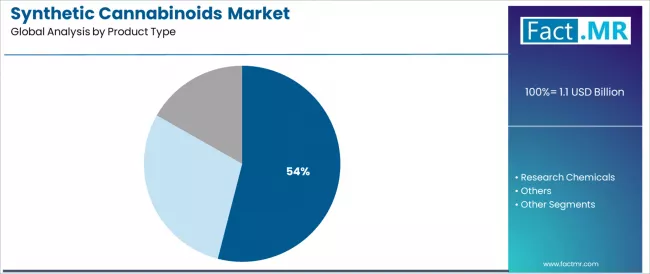
The pharmaceutical grade segment is projected to maintain its leading position in the synthetic cannabinoids market in 2025 with a 54% market share, reaffirming its role as the preferred product category for therapeutic development and clinical research applications. Pharmaceutical companies and research institutions increasingly utilize pharmaceutical grade synthetic cannabinoids for their superior purity standards, regulatory compliance capabilities, and proven effectiveness in supporting drug development programs while maintaining quality assurance and safety requirements. Pharmaceutical grade production's proven reliability and regulatory acceptance directly address industry requirements for therapeutic development and established clinical research standards across diverse medical applications and development programs.
This product segment forms the foundation of legitimate synthetic cannabinoid applications, as it represents the category with the greatest contribution to therapeutic advancement and established regulatory recognition across multiple pharmaceutical companies and research institutions. Medical industry investments in pharmaceutical grade synthetic cannabinoids continue to strengthen adoption among researchers and developers. With therapeutic development requiring stringent quality standards, pharmaceutical grade synthetic cannabinoids align with both regulatory objectives and safety requirements, making them the central component of comprehensive cannabinoid drug development strategies.
By Application, the Pain/Neurology R&D Segment Dominates Market Demand
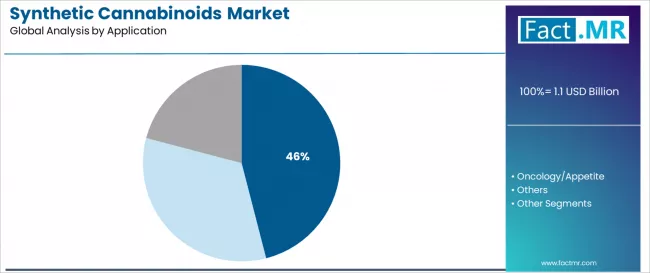
The pain/neurology R&D application segment is projected to represent the largest share of synthetic cannabinoids demand in 2025 with a 46% market share, underscoring its critical role as the primary driver for synthetic cannabinoid adoption across neurological research, pain management studies, and therapeutic development programs. Researchers prefer synthetic cannabinoids for pain and neurology applications due to their precise targeting capabilities, consistent pharmacological profiles, and ability to support mechanistic studies while maintaining research validity and therapeutic potential. Positioned as essential compounds for neurological research, synthetic cannabinoids offer both research advantages and therapeutic development benefits.
The segment is supported by continuous advancement in neuroscience research and the growing availability of specialized synthetic cannabinoid compounds that enable superior research outcomes with enhanced selectivity and therapeutic windows. Additionally, pharmaceutical researchers are investing in comprehensive cannabinoid research programs to support increasingly sophisticated synthetic cannabinoid applications and drug development requirements for neurological conditions. As neurological research advances and pain management needs increase, the pain/neurology R&D application will continue to dominate the market while supporting advanced therapeutic development and research innovation.
What are the Drivers, Restraints, and Key Trends of the Synthetic Cannabinoids Market?
The synthetic cannabinoids market is advancing rapidly due to increasing pharmaceutical research into cannabinoid therapeutics driven by growing understanding of endocannabinoid system mechanisms and therapeutic applications, alongside expanding clinical development programs that require standardized synthetic compounds for pain management, neurological disorders, and oncology support applications across pharmaceutical companies and research institutions. However, the market faces challenges, including complex regulatory frameworks across different jurisdictions, safety concerns and abuse potential for certain compounds, and public perception issues related to recreational drug associations. Innovation in selective receptor targeting and therapeutic optimization continues to influence research directions and commercial development patterns.
Expansion of Pharmaceutical Research and Clinical Development
The growing pharmaceutical interest in cannabinoid-based therapeutics is driving demand for synthetic cannabinoids that can support drug discovery, enable clinical trials, and provide standardized therapeutic compounds through precise molecular design and controlled pharmacological profiles. Pharmaceutical researchers require synthetic cannabinoid tools that deliver predictable research outcomes across multiple therapeutic targets while maintaining safety profiles and regulatory compliance. Drug development companies are increasingly recognizing the competitive advantages of synthetic cannabinoid research for therapeutic innovation and market differentiation, creating opportunities for specialized compounds designed for specific therapeutic applications and clinical development programs.
Integration of Precision Medicine and Targeted Therapeutics
Modern synthetic cannabinoid developers are incorporating precision medicine approaches and targeted therapeutic strategies to enhance selectivity, improve therapeutic windows, and support personalized treatment approaches through receptor-specific design, biomarker integration, and pharmacogenomic optimization. Leading companies are developing selective cannabinoid receptor modulators, implementing biomarker-driven development strategies, and advancing precision medicine platforms that optimize therapeutic outcomes while minimizing side effects and safety concerns. These approaches improve therapeutic potential while enabling new market opportunities, including personalized cannabinoid medicine, targeted neurological therapies, and precision pain management solutions.
Development of Novel Synthetic Compounds and Mechanisms
The expansion of cannabinoid research and molecular pharmacology is driving development of novel synthetic cannabinoid compounds with enhanced selectivity, improved safety profiles, and optimized therapeutic characteristics that address current limitations and expand therapeutic applications beyond traditional cannabinoid effects. These advanced compounds require sophisticated medicinal chemistry capabilities and pharmacological expertise that exceed traditional drug development requirements, creating specialized market segments with differentiated therapeutic propositions. Researchers are investing in molecular design and pharmacological optimization to serve emerging therapeutic applications while supporting innovation in cannabinoid medicine and neurological therapeutics.
Analysis of the Synthetic Cannabinoids Market by Key Countries
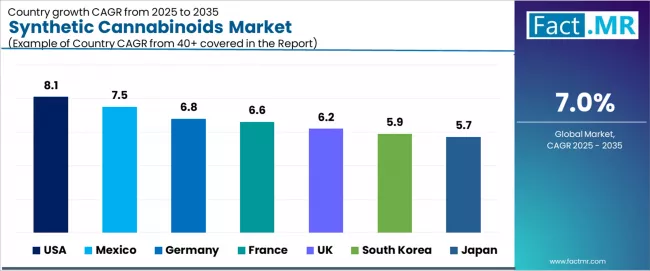
| Country | CAGR (2025-2035) |
|---|---|
| USA | 8.1% |
| Mexico | 7.5% |
| Germany | 6.8% |
| France | 6.6% |
| UK | 6.2% |
| South Korea | 5.9% |
| Japan | 5.7% |
The synthetic cannabinoids market is experiencing strong growth globally, with the USA leading at a 8.1% CAGR through 2035, driven by extensive pharmaceutical research infrastructure, progressive cannabinoid research policies, and strong investment in neurological and pain management therapeutic development supporting synthetic cannabinoid adoption. Mexico follows at 7.5%, supported by expanding pharmaceutical research capabilities, growing medical research investment, and increasing collaboration with international drug development programs. Germany shows growth at 6.8%, emphasizing pharmaceutical research excellence, regulatory leadership, and comprehensive drug development capabilities. France demonstrates 6.6% growth, supported by pharmaceutical innovation, neurological research leadership, and medical research infrastructure. The UK records 6.2%, focusing on drug discovery innovation, pharmaceutical research excellence, and therapeutic development programs. South Korea exhibits 5.9% growth, emphasizing biotechnology advancement and pharmaceutical research development. Japan shows 5.7% growth, supported by pharmaceutical industry leadership and advanced medical research capabilities.
USA Leads Global Market Growth with Research Innovation Excellence
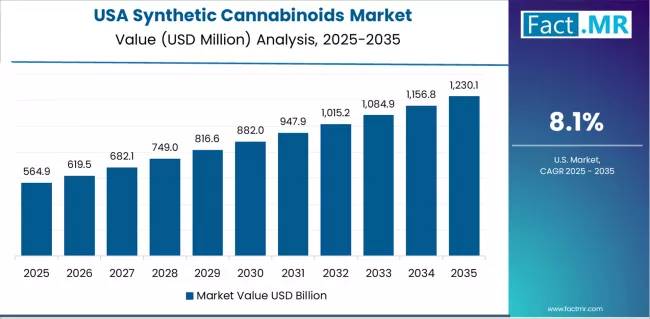
Revenue from synthetic cannabinoids in the USA is projected to exhibit strong growth with a CAGR of 8.1% through 2035, driven by extensive pharmaceutical research infrastructure and progressive cannabinoid research policies supporting synthetic cannabinoid adoption among leading pharmaceutical companies, research institutions, and biotechnology firms. The country's established drug development ecosystem and increasing investment in cannabinoid therapeutics are creating substantial demand for synthetic cannabinoid solutions. Major pharmaceutical companies and research organizations are establishing comprehensive cannabinoid research and development capabilities to serve both domestic research needs and global therapeutic development opportunities.
- Strong pharmaceutical research infrastructure and progressive research policies are driving demand for synthetic cannabinoids throughout drug development companies, research institutions, and clinical development organizations across innovation hubs, research centers, and pharmaceutical facilities.
- Growing investment in cannabinoid therapeutics and neurological drug development are supporting the rapid advancement of synthetic cannabinoid research among companies seeking therapeutic innovation, competitive advantages, and breakthrough drug development in pain management and neurological applications.
Mexico Demonstrates Strong Market Potential with Research Expansion
Revenue from synthetic cannabinoids in Mexico is expanding at a CAGR of 7.5%, supported by the country's expanding pharmaceutical research capabilities, growing medical research investment, and increasing collaboration with international drug development programs and cannabinoid research initiatives. The country's evolving research infrastructure and pharmaceutical development are driving demand for synthetic cannabinoid research tools throughout academic and commercial research sectors. Leading research institutions and pharmaceutical companies are establishing comprehensive research capabilities to address growing domestic research needs and international collaboration opportunities.
- Rising pharmaceutical research investment and expanding medical research infrastructure are creating opportunities for synthetic cannabinoid adoption across research institutions, pharmaceutical companies, and biotechnology development centers in major research regions and academic hubs.
- Growing international collaboration and drug development partnerships are driving adoption of synthetic cannabinoid research tools among institutions seeking enhanced research capabilities and participation in global therapeutic development programs.
Germany Demonstrates Research Excellence with Regulatory Leadership
Revenue from synthetic cannabinoids in Germany is expanding at a CAGR of 6.8%, driven by the country's pharmaceutical research excellence, regulatory leadership in cannabinoid research, and comprehensive drug development capabilities supporting innovative synthetic cannabinoid adoption. Germany's pharmaceutical industry sophistication and research standards are driving demand for high-quality synthetic cannabinoid solutions. Leading pharmaceutical and research companies are establishing comprehensive innovation programs for advanced cannabinoid therapeutics development.
- Advanced pharmaceutical research standards and regulatory expertise are creating demand for premium synthetic cannabinoid products among research institutions seeking enhanced research capabilities and therapeutic development excellence.
- Strong pharmaceutical industry leadership and drug development expertise are supporting the adoption of synthetic cannabinoid research tools across pharmaceutical facilities, research centers, and clinical development organizations throughout major research and industrial regions.
France Focuses on Pharmaceutical Innovation and Neurological Research
Revenue from synthetic cannabinoids in France is expanding at a CAGR of 6.6%, driven by the country's pharmaceutical innovation leadership, neurological research excellence, and comprehensive approach to medical research supporting synthetic cannabinoid integration into French pharmaceutical development and neurological therapeutic research. France's medical research sophistication and pharmaceutical expertise are supporting investment in cannabinoid therapeutic technologies. Major pharmaceutical companies and research institutions are establishing comprehensive innovation programs incorporating synthetic cannabinoids with French medical research excellence.
- Advanced pharmaceutical innovation and neurological research leadership are creating demand for synthetic cannabinoids throughout pharmaceutical research facilities, neurological research centers, and medical innovation institutes serving therapeutic development and research excellence.
- Strong medical research culture and pharmaceutical development focus are driving the adoption of synthetic cannabinoid research tools across medical research programs, pharmaceutical development initiatives, and neurological therapeutic research throughout major research and medical regions.
UK Shows Market Leadership with Drug Discovery Innovation
Revenue from synthetic cannabinoids in the UK is expanding at a CAGR of 6.2%, supported by the country's drug discovery innovation, pharmaceutical research excellence, and comprehensive therapeutic development programs supporting synthetic cannabinoid utilization across diverse medical research and pharmaceutical development applications. The UK's pharmaceutical research maturity and innovation capabilities are driving demand for advanced synthetic cannabinoid solutions. Leading pharmaceutical companies and research institutions are investing in cannabinoid research development and therapeutic innovation for competitive advantage.
- Advanced drug discovery capabilities and pharmaceutical research excellence are creating opportunities for synthetic cannabinoids throughout pharmaceutical companies, research institutions, and biotechnology firms serving therapeutic development and medical research applications.
- Strong pharmaceutical innovation culture and therapeutic development focus are driving the adoption of synthetic cannabinoids across drug discovery programs, clinical research initiatives, and therapeutic development projects targeting neurological and pain management applications.
South Korea Demonstrates Technology Leadership with Pharmaceutical Development
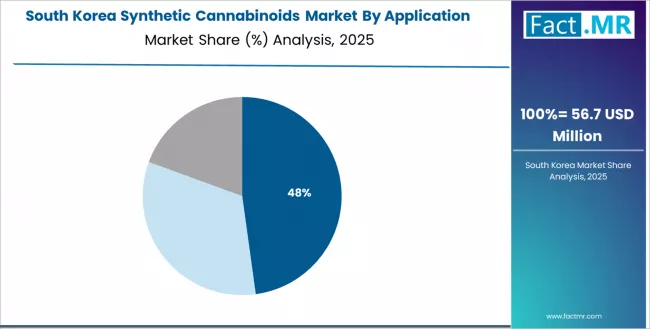
Revenue from synthetic cannabinoids in South Korea is expanding at a CAGR of 5.9%, supported by the country's biotechnology advancement, pharmaceutical research development, and growing emphasis on medical innovation and therapeutic technology supporting advanced synthetic cannabinoid adoption. The nation's technological sophistication and pharmaceutical development capabilities are driving demand for innovative synthetic cannabinoid solutions. Leading biotechnology and pharmaceutical companies are investing extensively in medical research and therapeutic development market expansion.
- Advanced biotechnology capabilities and pharmaceutical development focus are creating demand for synthetic cannabinoids throughout biotechnology companies, pharmaceutical research facilities, and medical innovation centers.
- Strong medical technology innovation and pharmaceutical research emphasis are supporting the adoption of synthetic cannabinoid research tools designed for advanced therapeutic development, medical innovation, and pharmaceutical research applications across diverse medical and biotechnology segments.
Japan Shows Premium Focus with Pharmaceutical Excellence
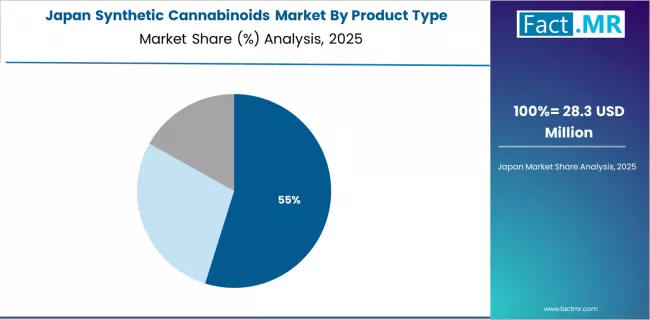
Revenue from synthetic cannabinoids in Japan is expanding at a CAGR of 5.7%, supported by the country's pharmaceutical industry leadership, advanced medical research capabilities, and strong emphasis on therapeutic innovation and medical technology supporting synthetic cannabinoid adoption for pharmaceutical excellence. Japan's pharmaceutical sophistication and medical research quality are driving demand for premium synthetic cannabinoid products. Leading pharmaceutical and medical research companies are investing in specialized capabilities for advanced therapeutic research and pharmaceutical development applications.
- Advanced pharmaceutical industry leadership and medical research capabilities are creating opportunities for synthetic cannabinoids throughout pharmaceutical companies, medical research institutions, and therapeutic development centers serving premium research and pharmaceutical applications.
- Strong pharmaceutical excellence and therapeutic innovation focus are driving adoption of premium synthetic cannabinoid research tools meeting Japanese standards for pharmaceutical research, therapeutic development, and comprehensive medical innovation across diverse pharmaceutical and medical research applications.
Europe Market Split by Country
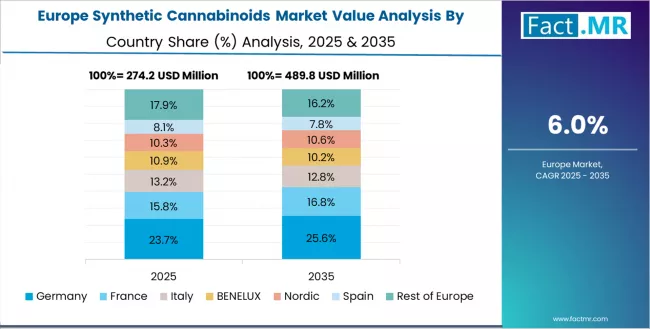
The synthetic cannabinoids market in Europe is projected to grow from USD 295.0 million in 2025 to USD 565.0 million by 2035, registering a CAGR of 6.7% over the forecast period. Germany is expected to maintain leadership with a 34.2% market share in 2025, moderating to 33.8% by 2035, supported by pharmaceutical research excellence, regulatory leadership, and comprehensive drug development capabilities.
France follows with 26.4% in 2025, projected to reach 26.7% by 2035, driven by pharmaceutical innovation leadership, neurological research excellence, and medical research infrastructure development. The United Kingdom holds 23.7% in 2025, expected to reach 24.0% by 2035 due to drug discovery innovation and pharmaceutical research excellence. Italy commands 9.8% in 2025, rising to 9.9% by 2035, while Spain accounts for 4.1% in 2025, reaching 4.2% by 2035. The Rest of Europe region is anticipated to hold 1.8% in 2025 and 1.4% by 2035, reflecting steady pharmaceutical research development in Nordic countries and emerging biotechnology markets in Eastern European countries with growing pharmaceutical research capabilities.
Competitive Landscape of the Synthetic Cannabinoids Market
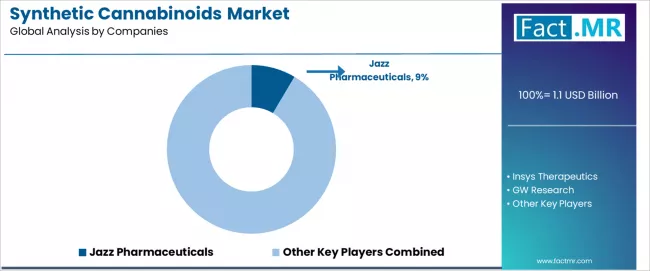
The synthetic cannabinoids market is characterized by competition among established pharmaceutical companies, specialized biotechnology firms, and research-focused organizations. Companies are investing in drug discovery technology development, clinical research programs, regulatory compliance systems, and therapeutic innovation to deliver safe, effective, and commercially viable synthetic cannabinoid solutions. Innovation in molecular design, therapeutic optimization, and clinical development is central to strengthening market position and competitive advantage.
Jazz Pharmaceuticals leads the market with an 8.5% share, offering comprehensive synthetic cannabinoid solutions with focus on therapeutic development, clinical research excellence, and regulatory compliance across diverse neurological and pain management applications. The company continues investing in clinical development programs, regulatory strategies, and therapeutic innovation while expanding market presence and therapeutic applications. Insys Therapeutics provides specialized pharmaceutical solutions with emphasis on cannabinoid-based therapeutics. GW Research focuses on cannabinoid drug development and clinical research. Canopy Growth emphasizes pharmaceutical cannabinoid development and research applications. Tilray Brands offers medical cannabinoid solutions and research support. Corbus Pharmaceuticals specializes in synthetic cannabinoid therapeutics development.
Key Players in the Synthetic Cannabinoids Market
- Jazz Pharmaceuticals
- Insys Therapeutics
- GW Research
- Canopy Growth
- Tilray Brands
- Corbus Pharmaceuticals
- Zynerba
- Kindeva
- AbbVie
- Piramal Pharma Solutions
Scope of the Report
| Items | Values |
|---|---|
| Quantitative Units (2025) | USD 1.1 billion |
| Product Type | Pharmaceutical Grade, Research Chemicals, Others |
| Application | Pain/Neurology R&D, Oncology/Appetite, Others |
| Route of Administration | Oral, Inhalation, Topical/Parenteral |
| Regions Covered | North America, Europe, Asia-Pacific, Latin America, Middle East & Africa |
| Countries Covered | USA, Mexico, Germany, France, UK, Japan, South Korea, and 40+ countries |
| Key Companies Profiled | Jazz Pharmaceuticals, Insys Therapeutics, GW Research, Canopy Growth, Tilray Brands, Corbus Pharmaceuticals |
| Additional Attributes | Dollar sales by product type and application, regional demand trends, competitive landscape, pharmaceutical research advancement, clinical development progress, regulatory compliance development, and therapeutic innovation optimization |
Synthetic Cannabinoids Market by Segments
-
Product Type :
- Pharmaceutical Grade
- Research Chemicals
- Others
-
Application :
- Pain/Neurology R&D
- Oncology/Appetite
- Others
-
Route of Administration :
- Oral
- Inhalation
- Topical/Parenteral
-
Region :
-
North America
- United States
- Canada
- Mexico
-
Europe
- Germany
- United Kingdom
- France
- Italy
- Spain
- Netherlands
- Rest of Europe
-
Asia-Pacific
- Japan
- South Korea
- China
- India
- Australia
- Rest of Asia-Pacific
-
Latin America
- Brazil
- Argentina
- Rest of Latin America
-
Middle East & Africa
- Kingdom of Saudi Arabia
- South Africa
- Rest of Middle East & Africa
-
Table of Content
- Executive Summary
- Global Market Outlook
- Demand to side Trends
- Supply to side Trends
- Technology Roadmap Analysis
- Analysis and Recommendations
- Market Overview
- Market Coverage / Taxonomy
- Market Definition / Scope / Limitations
- Market Background
- Market Dynamics
- Drivers
- Restraints
- Opportunity
- Trends
- Scenario Forecast
- Demand in Optimistic Scenario
- Demand in Likely Scenario
- Demand in Conservative Scenario
- Opportunity Map Analysis
- Product Life Cycle Analysis
- Supply Chain Analysis
- Investment Feasibility Matrix
- Value Chain Analysis
- PESTLE and Porter’s Analysis
- Regulatory Landscape
- Regional Parent Market Outlook
- Production and Consumption Statistics
- Import and Export Statistics
- Market Dynamics
- Global Market Analysis 2020 to 2024 and Forecast, 2025 to 2035
- Historical Market Size Value (USD Million) Analysis, 2020 to 2024
- Current and Future Market Size Value (USD Million) Projections, 2025 to 2035
- Y to o to Y Growth Trend Analysis
- Absolute $ Opportunity Analysis
- Global Market Pricing Analysis 2020 to 2024 and Forecast 2025 to 2035
- Global Market Analysis 2020 to 2024 and Forecast 2025 to 2035, By Product Type
- Introduction / Key Findings
- Historical Market Size Value (USD Million) Analysis By Product Type , 2020 to 2024
- Current and Future Market Size Value (USD Million) Analysis and Forecast By Product Type , 2025 to 2035
- Pharmaceutical Grade
- Research Chemicals
- Others
- Y to o to Y Growth Trend Analysis By Product Type , 2020 to 2024
- Absolute $ Opportunity Analysis By Product Type , 2025 to 2035
- Global Market Analysis 2020 to 2024 and Forecast 2025 to 2035, By Application
- Introduction / Key Findings
- Historical Market Size Value (USD Million) Analysis By Application, 2020 to 2024
- Current and Future Market Size Value (USD Million) Analysis and Forecast By Application, 2025 to 2035
- Pain/Neurology R&D
- Oncology/Appetite
- Others
- Y to o to Y Growth Trend Analysis By Application, 2020 to 2024
- Absolute $ Opportunity Analysis By Application, 2025 to 2035
- Global Market Analysis 2020 to 2024 and Forecast 2025 to 2035, By Region
- Introduction
- Historical Market Size Value (USD Million) Analysis By Region, 2020 to 2024
- Current Market Size Value (USD Million) Analysis and Forecast By Region, 2025 to 2035
- North America
- Latin America
- Western Europe
- Eastern Europe
- East Asia
- South Asia and Pacific
- Middle East & Africa
- Market Attractiveness Analysis By Region
- North America Market Analysis 2020 to 2024 and Forecast 2025 to 2035, By Country
- Historical Market Size Value (USD Million) Trend Analysis By Market Taxonomy, 2020 to 2024
- Market Size Value (USD Million) Forecast By Market Taxonomy, 2025 to 2035
- By Country
- USA
- Canada
- Mexico
- By Product Type
- By Application
- By Country
- Market Attractiveness Analysis
- By Country
- By Product Type
- By Application
- Key Takeaways
- Latin America Market Analysis 2020 to 2024 and Forecast 2025 to 2035, By Country
- Historical Market Size Value (USD Million) Trend Analysis By Market Taxonomy, 2020 to 2024
- Market Size Value (USD Million) Forecast By Market Taxonomy, 2025 to 2035
- By Country
- Brazil
- Chile
- Rest of Latin America
- By Product Type
- By Application
- By Country
- Market Attractiveness Analysis
- By Country
- By Product Type
- By Application
- Key Takeaways
- Western Europe Market Analysis 2020 to 2024 and Forecast 2025 to 2035, By Country
- Historical Market Size Value (USD Million) Trend Analysis By Market Taxonomy, 2020 to 2024
- Market Size Value (USD Million) Forecast By Market Taxonomy, 2025 to 2035
- By Country
- Germany
- UK
- Italy
- Spain
- France
- Nordic
- BENELUX
- Rest of Western Europe
- By Product Type
- By Application
- By Country
- Market Attractiveness Analysis
- By Country
- By Product Type
- By Application
- Key Takeaways
- Eastern Europe Market Analysis 2020 to 2024 and Forecast 2025 to 2035, By Country
- Historical Market Size Value (USD Million) Trend Analysis By Market Taxonomy, 2020 to 2024
- Market Size Value (USD Million) Forecast By Market Taxonomy, 2025 to 2035
- By Country
- Russia
- Poland
- Hungary
- Balkan & Baltic
- Rest of Eastern Europe
- By Product Type
- By Application
- By Country
- Market Attractiveness Analysis
- By Country
- By Product Type
- By Application
- Key Takeaways
- East Asia Market Analysis 2020 to 2024 and Forecast 2025 to 2035, By Country
- Historical Market Size Value (USD Million) Trend Analysis By Market Taxonomy, 2020 to 2024
- Market Size Value (USD Million) Forecast By Market Taxonomy, 2025 to 2035
- By Country
- China
- Japan
- South Korea
- By Product Type
- By Application
- By Country
- Market Attractiveness Analysis
- By Country
- By Product Type
- By Application
- Key Takeaways
- South Asia and Pacific Market Analysis 2020 to 2024 and Forecast 2025 to 2035, By Country
- Historical Market Size Value (USD Million) Trend Analysis By Market Taxonomy, 2020 to 2024
- Market Size Value (USD Million) Forecast By Market Taxonomy, 2025 to 2035
- By Country
- India
- ASEAN
- Australia & New Zealand
- Rest of South Asia and Pacific
- By Product Type
- By Application
- By Country
- Market Attractiveness Analysis
- By Country
- By Product Type
- By Application
- Key Takeaways
- Middle East & Africa Market Analysis 2020 to 2024 and Forecast 2025 to 2035, By Country
- Historical Market Size Value (USD Million) Trend Analysis By Market Taxonomy, 2020 to 2024
- Market Size Value (USD Million) Forecast By Market Taxonomy, 2025 to 2035
- By Country
- Kingdom of Saudi Arabia
- Other GCC Countries
- Turkiye
- South Africa
- Other African Union
- Rest of Middle East & Africa
- By Product Type
- By Application
- By Country
- Market Attractiveness Analysis
- By Country
- By Product Type
- By Application
- Key Takeaways
- Key Countries Market Analysis
- USA
- Pricing Analysis
- Market Share Analysis, 2024
- By Product Type
- By Application
- Canada
- Pricing Analysis
- Market Share Analysis, 2024
- By Product Type
- By Application
- Mexico
- Pricing Analysis
- Market Share Analysis, 2024
- By Product Type
- By Application
- Brazil
- Pricing Analysis
- Market Share Analysis, 2024
- By Product Type
- By Application
- Chile
- Pricing Analysis
- Market Share Analysis, 2024
- By Product Type
- By Application
- Germany
- Pricing Analysis
- Market Share Analysis, 2024
- By Product Type
- By Application
- UK
- Pricing Analysis
- Market Share Analysis, 2024
- By Product Type
- By Application
- Italy
- Pricing Analysis
- Market Share Analysis, 2024
- By Product Type
- By Application
- Spain
- Pricing Analysis
- Market Share Analysis, 2024
- By Product Type
- By Application
- France
- Pricing Analysis
- Market Share Analysis, 2024
- By Product Type
- By Application
- India
- Pricing Analysis
- Market Share Analysis, 2024
- By Product Type
- By Application
- ASEAN
- Pricing Analysis
- Market Share Analysis, 2024
- By Product Type
- By Application
- Australia & New Zealand
- Pricing Analysis
- Market Share Analysis, 2024
- By Product Type
- By Application
- China
- Pricing Analysis
- Market Share Analysis, 2024
- By Product Type
- By Application
- Japan
- Pricing Analysis
- Market Share Analysis, 2024
- By Product Type
- By Application
- South Korea
- Pricing Analysis
- Market Share Analysis, 2024
- By Product Type
- By Application
- Russia
- Pricing Analysis
- Market Share Analysis, 2024
- By Product Type
- By Application
- Poland
- Pricing Analysis
- Market Share Analysis, 2024
- By Product Type
- By Application
- Hungary
- Pricing Analysis
- Market Share Analysis, 2024
- By Product Type
- By Application
- Kingdom of Saudi Arabia
- Pricing Analysis
- Market Share Analysis, 2024
- By Product Type
- By Application
- Turkiye
- Pricing Analysis
- Market Share Analysis, 2024
- By Product Type
- By Application
- South Africa
- Pricing Analysis
- Market Share Analysis, 2024
- By Product Type
- By Application
- USA
- Market Structure Analysis
- Competition Dashboard
- Competition Benchmarking
- Market Share Analysis of Top Players
- By Regional
- By Product Type
- By Application
- Competition Analysis
- Competition Deep Dive
- Jazz Pharmaceuticals
- Overview
- Product Portfolio
- Profitability by Market Segments (Product/Age /Sales Channel/Region)
- Sales Footprint
- Strategy Overview
- Marketing Strategy
- Product Strategy
- Channel Strategy
- Insys Therapeutics
- GW Research
- Canopy Growth
- Tilray Brands
- Corbus Pharmaceuticals
- Zynerba
- Kindeva
- AbbVie
- Piramal Pharma Solutions
- Jazz Pharmaceuticals
- Competition Deep Dive
- Assumptions & Acronyms Used
- Research Methodology
List Of Table
- Table 1: Global Market Value (USD Million) Forecast by Region, 2020 to 2035
- Table 2: Global Market Value (USD Million) Forecast by Product Type , 2020 to 2035
- Table 3: Global Market Value (USD Million) Forecast by Application, 2020 to 2035
- Table 4: North America Market Value (USD Million) Forecast by Country, 2020 to 2035
- Table 5: North America Market Value (USD Million) Forecast by Product Type , 2020 to 2035
- Table 6: North America Market Value (USD Million) Forecast by Application, 2020 to 2035
- Table 7: Latin America Market Value (USD Million) Forecast by Country, 2020 to 2035
- Table 8: Latin America Market Value (USD Million) Forecast by Product Type , 2020 to 2035
- Table 9: Latin America Market Value (USD Million) Forecast by Application, 2020 to 2035
- Table 10: Western Europe Market Value (USD Million) Forecast by Country, 2020 to 2035
- Table 11: Western Europe Market Value (USD Million) Forecast by Product Type , 2020 to 2035
- Table 12: Western Europe Market Value (USD Million) Forecast by Application, 2020 to 2035
- Table 13: Eastern Europe Market Value (USD Million) Forecast by Country, 2020 to 2035
- Table 14: Eastern Europe Market Value (USD Million) Forecast by Product Type , 2020 to 2035
- Table 15: Eastern Europe Market Value (USD Million) Forecast by Application, 2020 to 2035
- Table 16: East Asia Market Value (USD Million) Forecast by Country, 2020 to 2035
- Table 17: East Asia Market Value (USD Million) Forecast by Product Type , 2020 to 2035
- Table 18: East Asia Market Value (USD Million) Forecast by Application, 2020 to 2035
- Table 19: South Asia and Pacific Market Value (USD Million) Forecast by Country, 2020 to 2035
- Table 20: South Asia and Pacific Market Value (USD Million) Forecast by Product Type , 2020 to 2035
- Table 21: South Asia and Pacific Market Value (USD Million) Forecast by Application, 2020 to 2035
- Table 22: Middle East & Africa Market Value (USD Million) Forecast by Country, 2020 to 2035
- Table 23: Middle East & Africa Market Value (USD Million) Forecast by Product Type , 2020 to 2035
- Table 24: Middle East & Africa Market Value (USD Million) Forecast by Application, 2020 to 2035
List Of Figures
- Figure 1: Global Market Pricing Analysis
- Figure 2: Global Market Value (USD Million) Forecast 2020-2035
- Figure 3: Global Market Value Share and BPS Analysis by Product Type , 2025 and 2035
- Figure 4: Global Market Y to o to Y Growth Comparison by Product Type , 2025-2035
- Figure 5: Global Market Attractiveness Analysis by Product Type
- Figure 6: Global Market Value Share and BPS Analysis by Application, 2025 and 2035
- Figure 7: Global Market Y to o to Y Growth Comparison by Application, 2025-2035
- Figure 8: Global Market Attractiveness Analysis by Application
- Figure 9: Global Market Value (USD Million) Share and BPS Analysis by Region, 2025 and 2035
- Figure 10: Global Market Y to o to Y Growth Comparison by Region, 2025-2035
- Figure 11: Global Market Attractiveness Analysis by Region
- Figure 12: North America Market Incremental Dollar Opportunity, 2025-2035
- Figure 13: Latin America Market Incremental Dollar Opportunity, 2025-2035
- Figure 14: Western Europe Market Incremental Dollar Opportunity, 2025-2035
- Figure 15: Eastern Europe Market Incremental Dollar Opportunity, 2025-2035
- Figure 16: East Asia Market Incremental Dollar Opportunity, 2025-2035
- Figure 17: South Asia and Pacific Market Incremental Dollar Opportunity, 2025-2035
- Figure 18: Middle East & Africa Market Incremental Dollar Opportunity, 2025-2035
- Figure 19: North America Market Value Share and BPS Analysis by Country, 2025 and 2035
- Figure 20: North America Market Value Share and BPS Analysis by Product Type , 2025 and 2035
- Figure 21: North America Market Y to o to Y Growth Comparison by Product Type , 2025-2035
- Figure 22: North America Market Attractiveness Analysis by Product Type
- Figure 23: North America Market Value Share and BPS Analysis by Application, 2025 and 2035
- Figure 24: North America Market Y to o to Y Growth Comparison by Application, 2025-2035
- Figure 25: North America Market Attractiveness Analysis by Application
- Figure 26: Latin America Market Value Share and BPS Analysis by Country, 2025 and 2035
- Figure 27: Latin America Market Value Share and BPS Analysis by Product Type , 2025 and 2035
- Figure 28: Latin America Market Y to o to Y Growth Comparison by Product Type , 2025-2035
- Figure 29: Latin America Market Attractiveness Analysis by Product Type
- Figure 30: Latin America Market Value Share and BPS Analysis by Application, 2025 and 2035
- Figure 31: Latin America Market Y to o to Y Growth Comparison by Application, 2025-2035
- Figure 32: Latin America Market Attractiveness Analysis by Application
- Figure 33: Western Europe Market Value Share and BPS Analysis by Country, 2025 and 2035
- Figure 34: Western Europe Market Value Share and BPS Analysis by Product Type , 2025 and 2035
- Figure 35: Western Europe Market Y to o to Y Growth Comparison by Product Type , 2025-2035
- Figure 36: Western Europe Market Attractiveness Analysis by Product Type
- Figure 37: Western Europe Market Value Share and BPS Analysis by Application, 2025 and 2035
- Figure 38: Western Europe Market Y to o to Y Growth Comparison by Application, 2025-2035
- Figure 39: Western Europe Market Attractiveness Analysis by Application
- Figure 40: Eastern Europe Market Value Share and BPS Analysis by Country, 2025 and 2035
- Figure 41: Eastern Europe Market Value Share and BPS Analysis by Product Type , 2025 and 2035
- Figure 42: Eastern Europe Market Y to o to Y Growth Comparison by Product Type , 2025-2035
- Figure 43: Eastern Europe Market Attractiveness Analysis by Product Type
- Figure 44: Eastern Europe Market Value Share and BPS Analysis by Application, 2025 and 2035
- Figure 45: Eastern Europe Market Y to o to Y Growth Comparison by Application, 2025-2035
- Figure 46: Eastern Europe Market Attractiveness Analysis by Application
- Figure 47: East Asia Market Value Share and BPS Analysis by Country, 2025 and 2035
- Figure 48: East Asia Market Value Share and BPS Analysis by Product Type , 2025 and 2035
- Figure 49: East Asia Market Y to o to Y Growth Comparison by Product Type , 2025-2035
- Figure 50: East Asia Market Attractiveness Analysis by Product Type
- Figure 51: East Asia Market Value Share and BPS Analysis by Application, 2025 and 2035
- Figure 52: East Asia Market Y to o to Y Growth Comparison by Application, 2025-2035
- Figure 53: East Asia Market Attractiveness Analysis by Application
- Figure 54: South Asia and Pacific Market Value Share and BPS Analysis by Country, 2025 and 2035
- Figure 55: South Asia and Pacific Market Value Share and BPS Analysis by Product Type , 2025 and 2035
- Figure 56: South Asia and Pacific Market Y to o to Y Growth Comparison by Product Type , 2025-2035
- Figure 57: South Asia and Pacific Market Attractiveness Analysis by Product Type
- Figure 58: South Asia and Pacific Market Value Share and BPS Analysis by Application, 2025 and 2035
- Figure 59: South Asia and Pacific Market Y to o to Y Growth Comparison by Application, 2025-2035
- Figure 60: South Asia and Pacific Market Attractiveness Analysis by Application
- Figure 61: Middle East & Africa Market Value Share and BPS Analysis by Country, 2025 and 2035
- Figure 62: Middle East & Africa Market Value Share and BPS Analysis by Product Type , 2025 and 2035
- Figure 63: Middle East & Africa Market Y to o to Y Growth Comparison by Product Type , 2025-2035
- Figure 64: Middle East & Africa Market Attractiveness Analysis by Product Type
- Figure 65: Middle East & Africa Market Value Share and BPS Analysis by Application, 2025 and 2035
- Figure 66: Middle East & Africa Market Y to o to Y Growth Comparison by Application, 2025-2035
- Figure 67: Middle East & Africa Market Attractiveness Analysis by Application
- Figure 68: Global Market - Tier Structure Analysis
- Figure 69: Global Market - Company Share Analysis
- FAQs -
How big is the synthetic cannabinoids market in 2025?
The global synthetic cannabinoids market is estimated to be valued at USD 1.1 billion in 2025.
What will be the size of synthetic cannabinoids market in 2035?
The market size for the synthetic cannabinoids market is projected to reach USD 2.2 billion by 2035.
How much will be the synthetic cannabinoids market growth between 2025 and 2035?
The synthetic cannabinoids market is expected to grow at a 7.0% CAGR between 2025 and 2035.
What are the key product types in the synthetic cannabinoids market?
The key product types in synthetic cannabinoids market are pharmaceutical grade, research chemicals and others.
Which application segment to contribute significant share in the synthetic cannabinoids market in 2025?
In terms of application, pain/neurology r&d segment to command 46.0% share in the synthetic cannabinoids market in 2025.